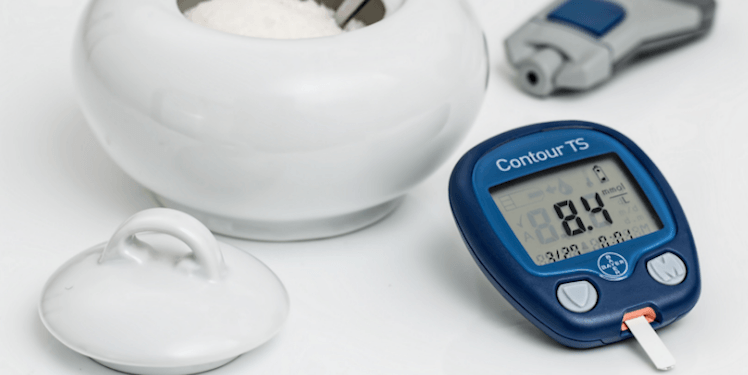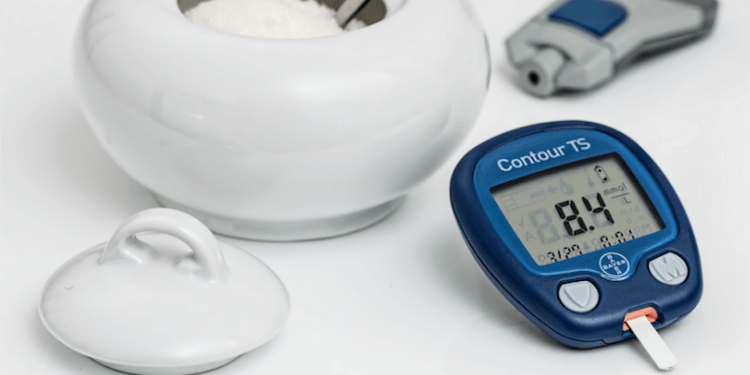DIABETES AND WEIGHT LOSS

Diabetes is the fastest growing chronic condition in Australia, with one new person diagnosed with the disease every five minutes. The number of people diagnosed has tripled in the last thirty years, and as the obesity epidemic continues to spread and our population ages, type 2 diabetes is likely to affect the lives of more and more Australians.
Diabetes: Definition and Classification
Diabetes is a group of disorders characterised by a chronic high blood sugar level (hyperglycaemia), resulting from the body’s failure to produce any or enough insulin to regulate it. There are two main types of diabetes:
Type 1 Diabetes Mellitus (T1DM) often occurs in children or adolescents and is caused by the body’s inability to make insulin.
Type 2 Diabetes Mellitus (T2DM) occurs as a result of the body’s inability to react properly toinsulin (insulin resistance). T2DM is more prevalent than T1DM and makes up roughly 90% of all diabetes cases. T2DM was previously diagnosed after the age of 40, however, it is now being found in all age ranges, including children and adolescents.
Why be Concerned about Diabetes?
The impact of diabetes goes beyond having chronically high blood sugar levels. Diabetes is the leading cause of blindness (diabetic retinopathy) and end stage kidney diseases (diabetic nephropathy). Every year there are 10,000 hospital admissions in Australia for diabetes-related foot ulcers, and many of these lead to amputation of a limb. People living with diabetes are also 2 – 4x more likely to experience cardiovascular complications and strokes, and are also more likely to experience depression and anxiety.
Obesity and T2DM: What is the link?
There are many risk factors for T2DM, including age, ethnicity, pregnancy, stress, some medications, high cholesterol levels, genetics and family history. However, the number one predictor of having the disease is overweight, or obesity. Approximately 90% of people living with T2DM are overweight or obese. Carrying excess weight exerts additional pressure on the body’s ability to use insulin toproperly control blood sugar levels, and therefore increases likelihood of developing T2DM. It has been estimated that if we were to eliminate obesity from the population, we could potentially reduce the incidence of type 2 diabetes by 38% in men and 47% in women.
Weight management, through lifestyle interventions including dietary changes and physical activity, is the single most important thing you can do to prevent the development of diabetes.
What you can do if you are living with Diabetes?
Medication
T1DM patients rely on insulin to maintain healthy blood sugar levels, T2DM patients may not require any medication, or may use insulin or drugs that sensitise their bodies to insulin. Patients should be aware how to safely manage their blood sugar levels and their medication or insulin.
Lifestyle
Making gradual changes to your lifestyle, such as choosing healthy foods, building up to exercising regularly and reducing your stress levels will help to lower your blood sugar levels, and may reduce the amount of medication needed. Ultimately, better nutrition, increased physical activity, and control of blood glucose levels can delay progression of diabetes and help prevent the complications associated with the disease.
One of the single most important things you can do to manage or prevent diabetes is to maintain a healthy body weight. Being overweight not only increases your risk of heart disease, stroke and some cancers, it also makes diabetes a more difficult disease to manage. Small steps such as:
- reducing portion sizes
- swapping from flavoured to plain dairy products (eg. Greek yoghurt)
- keep to 3 meals per day and try to eliminate snacks where possible
- use a small plate and aim for 1⁄2 plate low starch vegetables, 1⁄4 plate of lean protein and 1⁄4 plate of carbohydrate
- incorporate movement into your day, such as walking, cycling, dancing, swimming or running– start with 10 minutes/day and build up to 30 minutes
If you are serious about improving your health, start by introducing the above suggestions into your lifestyle gradually. Remember that small steps lead to big changes.
For more support with managing your diabetes and weight via nutrition, talk to your doctor about seeing a Dietitian.



